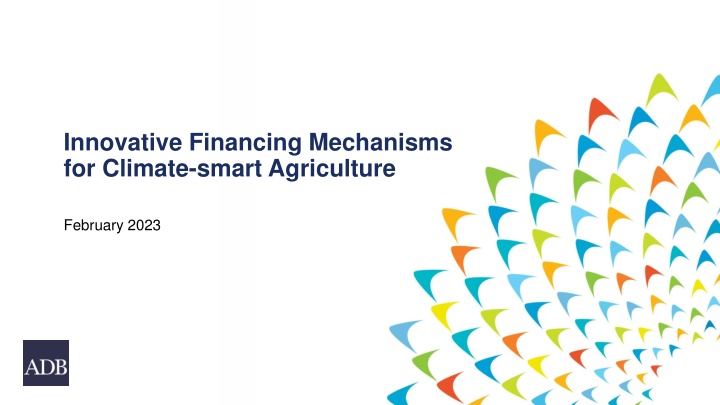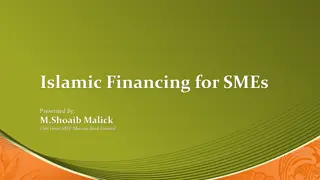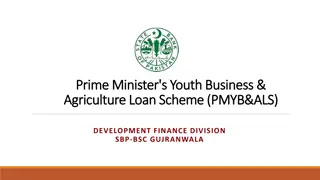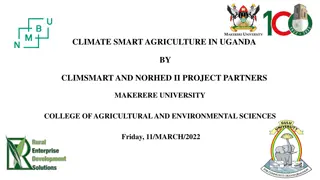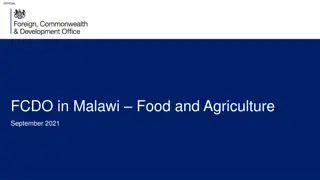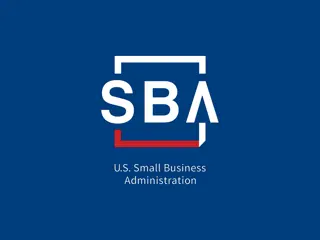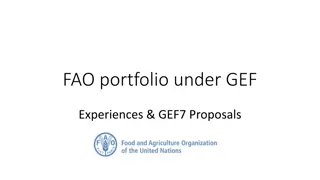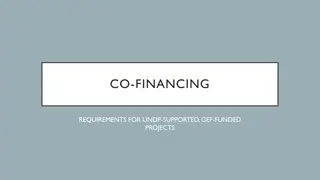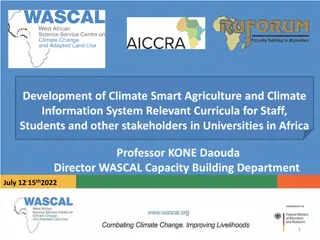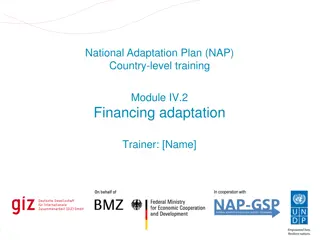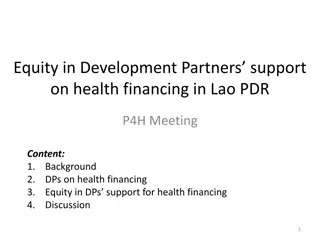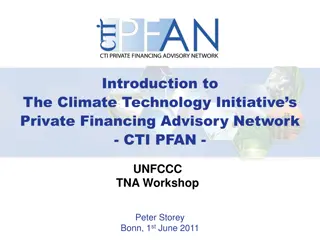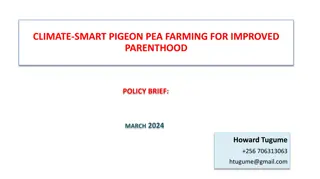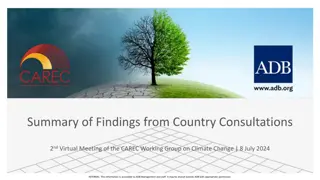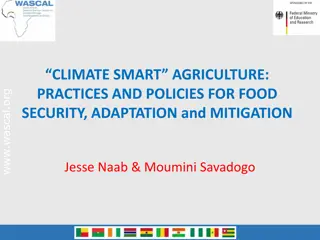ADB's Innovative Financing for Climate-Smart Agriculture
ADB is committed to financing climate-smart agriculture through innovative mechanisms to address the climate change-food-nature nexus. They aim to stimulate private sector participation, support policy reforms, and develop carbon markets sensitive to smallholders. With ambitious financing goals, ADB focuses on achieving food security and addressing food insecurity in Asia and the Pacific by investing billions over the coming years.
Download Presentation

Please find below an Image/Link to download the presentation.
The content on the website is provided AS IS for your information and personal use only. It may not be sold, licensed, or shared on other websites without obtaining consent from the author.If you encounter any issues during the download, it is possible that the publisher has removed the file from their server.
You are allowed to download the files provided on this website for personal or commercial use, subject to the condition that they are used lawfully. All files are the property of their respective owners.
The content on the website is provided AS IS for your information and personal use only. It may not be sold, licensed, or shared on other websites without obtaining consent from the author.
E N D
Presentation Transcript
Innovative Financing Mechanisms for Climate-smart Agriculture February 2023
Overview ADB s approach to financing climate-smart agriculture Develop food security investment pipeline with developing member countries that simultaneously supports ADB s climate and food security ambitions Support policy reforms essential for developing member countries to effectively adopt climate-smart practices Design innovative financing mechanisms that address the climate change-food-nature nexus Stimulate private sector participation in climate-smart agriculture through novel approaches Develop carbon markets that are especially sensitive to smallholders, inclusive, address economic and social contexts of member countries and scale well. 2 PUBLIC. This information is being disclosed to the public in accordance with ADB s Access to Information Policy.
ADB is Committed to be Asia and the Pacific's Climate Bank 2015: ADB made a commitment to double climate financing from its own resources to $6 billion annually by 2020 2021: ADB announced it is elevating its climate finance ambition to $100 billion from 2019-2030 2018 2022 2015 2021 2021: ADB commits to full alignment of sovereign operations with the goals of the Paris Agreement by 1 July 2023, and of non- sovereign operations to 85% by 1 July 2023, and fully by 1 July 2025. 2018: ADB committed to ensuring at least 75% of the total number of its operations support climate action and its own climate finance resources reach at least a cumulative $80 billion by 2030 3 3 PUBLIC. This information is being disclosed to the public in accordance with ADB s Access to Information Policy.
ADB has Announced its Ambition to Address Food Insecurity Sep 2022: ADB announced plans to provide at least $14 billion over 2022 2025 in a comprehensive program of support to ease a worsening food crisis in Asia and the Pacific ADB s ambition for food security 2022-2025 2023 In September 2022, ADB announced plans to provide $14 billion over 2022-2025 to address food insecurity Addressing climate-smart agriculture and the broader issue of climate change- food- nature nexus is a major priority May 2022: ADB, along with other MDBs, co-developed the IFI Action Plan to address food insecurity Nearly half of all targeted investments are targeting climate-smart agriculture and broader climate adaptation and mitigation goals 2022 $10.7 Billion 2019: ADB announced Strategy 2030, which address food security as a key operational priority $3.3 Billion 2019 2022 2023-2025 4 4 PUBLIC. This information is being disclosed to the public in accordance with ADB s Access to Information Policy.
Financing Policy Reforms in Agriculture Sector is Essential for Climate Resilience in the Developing World Several developing countries face structural issues at the nexus of agriculture and climate change. ADB s Policy-based lending (PBL) is an important mechanism of financing developing member country s needs while supporting policy reform. PBL are envisioned to be especially effective in supporting policy reforms at the nexus of climate change and agriculture. PBL provide financial resources to help meet a country s financing needs while supporting policy reforms that promote growth and poverty reduction. Funds are disbursed when evidence of the fulfillment of policy actions is provided. Competitive and Inclusive Agriculture Development Program Through trade policy and regulatory framework reforms, the PBL will support Philippines attain food security by building a competitive and inclusive agriculture sector that is characterized by improved efficiency, enhanced diversity, strengthened climate resilience, and higher farm incomes. 5 PUBLIC. This information is being disclosed to the public in accordance with ADB s Access to Information Policy.
Innovative Natural Capital Financing Facility (INCFF): Addressing the Food-Climate-Nature Nexus INCFF is a catalytic green blended finance facility designed to support projects with natural capital components in Asia and the Pacific. It has three main pillars. Natural capital (natural assets like land, forests, water, minerals, biodiversity and living things) accounts for over half of global GDP, 40% of the natural capital has eroded over the past 20 years with food systems as the primary driver. Asian Development Bank (ADB) recognizes the need for technical, financial, and institutional solutions to address these challenges. Investment in nature positive solutions is needed to scale solutions that preserve and promote natural capital and create climate-resilient food systems. 6 PUBLIC. This information is being disclosed to the public in accordance with ADB s Access to Information Policy.
Stimulate Private Sector Participation in Promoting Climate- smart Agriculture Practices Sustainability-Linked Loans (SLL) aim to facilitate and support environmentally and socially sustainable economic activity and growth. SLLs enable a discount on the interest rate margin if the borrower achieves certain pre- determined annual sustainability objectives. A SLL may also include a margin penalty if milestones are missed as negotiated between the lender and the borrower. DSNG Climate-Resilient Community-Based Agroforestry Value Chain Project $15m Sustainability-Linked Loan to DSNG, Indonesian leader in wood products and sustainable palm oil, to finance the expansion of DSNG s processing capacity and increased procurement of sengon and jabon timber cultivated by smallholder farmers in agroforestry systems in Java. The borrower and the lender agree on Key Performance Indicators (KPIs) that address relevant environmental, social, and /or governance (ESG) challenges of the industry or sector. KPIs: FSC forest management certification for farmers, requiring DSNG to support farmers to attain certifications that are highly aligned with climate resilience. Farmer extension services aims to create farmer training in climate- smart agriculture into DSNG s ongoing operations. Water conservation seeks to prepare the farmers for the future challenge of reduced water supply. The KPI should be ambitious, representing a material improvement in the respective KPIs and be beyond a business as usual trajectory. 7 PUBLIC. This information is being disclosed to the public in accordance with ADB s Access to Information Policy.
Develop carbon markets that are tailored for regions needs and sensitive to smallholder farmers Framing the ideal carbon market for Asia and the Pacific Smallholder farmers Solutions must bring maximum social, environmental and economic benefits by leveraging VCMs, following fair and equitable benefit-sharing principle Solutions must be farmer-centric, versatile to integrate other externalities & innovations, and forward-thinking Contribute to strengthening agricultural supply chains & fostering rural development Provide additional economic opportunities in the rural economy. $ Carbon Markets Potential for Voluntary Carbon Markets (VCM) Global VCM is valued at ~USD 2 Bn in 2021 Quadrupled in market value from 2020, driven by increased volume and value of NBS credits $ Issuances Retirement 354 279 187 143 156 162 63 37 44 34 70 76 53 96 Investors, Offtakers .. Over issuance and retirement is on rise, triggered by the global economic uncertainty 8 PUBLIC. This information is being disclosed to the public in accordance with ADB s Access to Information Policy.
Community Resilience Partnership Program: A Bottom-up Approach Partnership program to strengthen climate resilience by scaling up climate adaptation measures at the community level, that explicitly address the nexus between climate, poverty and gender. Objectives Strengthen climate policies and plans to support financing for community-led adaptation Mobilize large-scale public investments in poverty reduction to support community-led adaptation Achieve meaningful participation for poor women and men in resilience-related decision-making How will the program support climate-smart agriculture? Provide grants and technical assistance related support for Action research and knowledge work to identify investment opportunities for resilience building Building capacity of local institutions and communities to lead community-level adaptation measures Support governments in preparation of large-scale investment projects Pilots to demonstrate innovative approaches and solutions 9 PUBLIC. This information is being disclosed to the public in accordance with ADB s Access to Information Policy.
